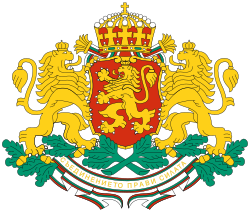Results
For the first time, women could stand as candidates, with Stoyanka Ancheva, Ekaterina Avramova, Tsola Dragoycheva, Stanka Ivanova, Tsvetana Keranova [ bg ], Elena Ketskarova, Mara Kinkel, Venera Klincharova, Vyara Makedonska, Stefana Markova, Ekaterina Nikolova, Rada Todorova, Mata Tyurkedzhieva, Maria Toteva and Vera Zlatareva becoming the first women in the National Assembly. [5]
 |
|---|
| Party | Votes | % | Seats |
|---|
| Bulgarian Communist Party | 3,005,983 | 88.14 | 94 |
| Bulgarian Agrarian National Union | 94 |
| Zveno | 45 |
| Bulgarian Social Democratic Workers' Party (Broad Socialists) | 31 |
| Radical Democratic Party | 11 |
| Opposition candidates | 404,482 | 11.86 | 1 |
| Total | 3,410,465 | 100.00 | 276 |
|
| Valid votes | 3,410,465 | 88.23 | |
|---|
| Invalid/blank votes | 455,000 | 11.77 | |
|---|
| Total votes | 3,865,465 | 100.00 | |
|---|
| Registered voters/turnout | 4,558,332 | 84.80 | |
|---|
| Source: Nohlen & Stöver |
This page is based on this
Wikipedia article Text is available under the
CC BY-SA 4.0 license; additional terms may apply.
Images, videos and audio are available under their respective licenses.

